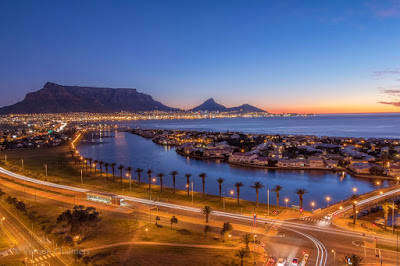APS-C (Crop sensor) vs Full Frame DSLRs for Landscape / Long Exposure Photography
During the upcoming Landscape & Long Exposure Workshop at Intaka Island / Woodbridge Island Cape Town, we will discuss the advantages / challenges of using an APS-C (Crop sensor) and / or Full Frame DSLR.
The majority of delegates attending my Landscape & Long Exposure Workshops in Cape Town are enthusiast photographers shooting with APS-C (Crop sensor) DSLRs.
The quality of the modern APS-C lenses are very good and judging from my own images (with both Full Frame and APS-C systems) there's not a lot of image quality difference between the APS-C ultra-wide lens (Canon EF-S) and the Full Frame ultra-wide lens (Canon EF) - but, there are various reasons why many enthusiast / professional photographers prefer Full Frame bodies and i.e. the Canon EF 16-35mm f/2.8L II lens.
I personally shoot with both Canon Full Frame (Canon EOS 6D) and APS-C bodies (Canon EOS 7D Mark II / Canon EOS 70D) and respect all for the versatility in application, function and image quality.
More important than the body you shooting / learning landscapes & long exposure photography with in my opinion will be the focal length of your lens used. There are a few options, but the most popular focal lengths for APS-C (Crop sensor) bodies will be the standard 18-55mm kit lens and also the ultra-wide option(s) in the 10-22mm range. Another useful option is the 18-135mm range.
Note: In most cases APS-C lenses are not compatible with Full Frame bodies. This is important when purchasing into a specif DSLR system - i.e, a Canon EF-S 10-18mm lens will not fit on a Canon EOS 6D (Full Frame body), but an EF 16-35mm lens (predominantly for full frame bodies) will fit and work on a Canon EOS 70D - the main difference will be the smaller field of view due to the 1.6 crop factor.
Canon APS-C Wide / Ulta-Wide Zoom Lens Options
Canon Full Frame Wide / Ulta-Wide Zoom Lens Options
If you're shooting with a full frame setup the general options are in the 16-35mm / 17-40mm / 24-70mm ranges. There are also the 24-104mm options that is quite useful. Popular (current / latest) options:
Attached images captured with an APS-C (Crop) sensor body - the Canon EOS 700D and the Canon EF-S 18-135mm f/3.5-5.6 IS STM lens.
During the upcoming Landscape & Long Exposure Workshop at Intaka Island / Woodbridge Island Cape Town, we will discuss the advantages / challenges of using an APS-C (Crop sensor) and / or Full Frame DSLR.
The majority of delegates attending my Landscape & Long Exposure Workshops in Cape Town are enthusiast photographers shooting with APS-C (Crop sensor) DSLRs.
The quality of the modern APS-C lenses are very good and judging from my own images (with both Full Frame and APS-C systems) there's not a lot of image quality difference between the APS-C ultra-wide lens (Canon EF-S) and the Full Frame ultra-wide lens (Canon EF) - but, there are various reasons why many enthusiast / professional photographers prefer Full Frame bodies and i.e. the Canon EF 16-35mm f/2.8L II lens.
I personally shoot with both Canon Full Frame (Canon EOS 6D) and APS-C bodies (Canon EOS 7D Mark II / Canon EOS 70D) and respect all for the versatility in application, function and image quality.
More important than the body you shooting / learning landscapes & long exposure photography with in my opinion will be the focal length of your lens used. There are a few options, but the most popular focal lengths for APS-C (Crop sensor) bodies will be the standard 18-55mm kit lens and also the ultra-wide option(s) in the 10-22mm range. Another useful option is the 18-135mm range.
Note: In most cases APS-C lenses are not compatible with Full Frame bodies. This is important when purchasing into a specif DSLR system - i.e, a Canon EF-S 10-18mm lens will not fit on a Canon EOS 6D (Full Frame body), but an EF 16-35mm lens (predominantly for full frame bodies) will fit and work on a Canon EOS 70D - the main difference will be the smaller field of view due to the 1.6 crop factor.
Canon APS-C Wide / Ulta-Wide Zoom Lens Options
- Canon EF-S 10-18mm f/4.5-5.6 IS STM lens
- Canon EF-S 10-22mm f/3.5-4.5 USM Lens
- Canon EF-S 18-55mm f/3.5-5.6 IS STM lens
- Canon EF-S 18-135mm f/3.5-5.6 IS STM / USM lenses
Canon Full Frame Wide / Ulta-Wide Zoom Lens Options
If you're shooting with a full frame setup the general options are in the 16-35mm / 17-40mm / 24-70mm ranges. There are also the 24-104mm options that is quite useful. Popular (current / latest) options:
- Canon EF 11-24mm f/4L USM lens
- Canon EF 16-35mm f/2.8L III USM lens
- Canon EF 16-35mm f/4 L IS USM lens
- Canon EF 24-70mm f/4 L IS USM lens
- Canon EF 24-105mm f/4-5.6 IS STM lens
- Canon EF 24-105mm f/4L IS USM lens
- Canon EF 24-105mm f/4L IS II USM lens
Attached images captured with an APS-C (Crop) sensor body - the Canon EOS 700D and the Canon EF-S 18-135mm f/3.5-5.6 IS STM lens.
Click to Enlarge
 |
| Table Mountain / Cape Town over Woodbridge Island - Camon APS-C 18-135mm lens |
 |
| Woodbridge Island: Milnerton Cape Town - Canon APS-C 18-135mm lens |
 |
| V&A Waterfront Cape Town - Canon APS-C 18-135mm lens Woodbridge Island Photography View |
